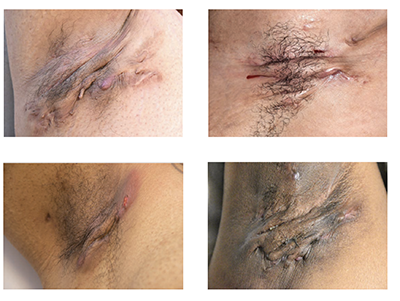Hidradenitis Suppurativa (HS) is a debilitating, chronic, inflammatory illness which presents with extremely painful recurring boil-like abscesses and can be associated with many underlying medical conditions. These abscesses may start out looking like acne (small, pus-filled bumps that can open into sores) that can develop anywhere hair follicles are found. While it is possible to experience abscesses or lesions anywhere on the body with the exception of the palms of the hands and soles of the feet, this condition more commonly occurs in body folds like the armpits and groin. HS has a huge impact on the quality of life physically, mentally, socially, emotionally and financially.
HS may come with a lot more baggage, aka other symptoms, such as fatigue, low grade fever, and overall malaise, especially during a flare. It is common to have other follicular skin conditions, immune mediated inflammatory illnesses and inflammatory illnesses with HS. It is not uncommon to have other autoinflammatory illness(es) along with HS. .
Importantly, HS is NOT:
- An STD
- Contagious
- Rare
HS does not discriminate against age, race, sexual orientation, beliefs, intellectual/ developmental or physical disabilities, blood type, size, shape, or geographic location.
What does HS look like?

If you have HS, you will notice bumps on your body in areas where skin touches skin. This condition is most common in the armpits and groin, but can occur on areas like the chest and back and not be in a body fold. It also may appear on and under the breasts, on the buttocks, and around the anus.
HS bumps may look like pimples, deep acne-like cysts or blackheads, swollen pimples with a hair in the center, or boils. If they break open or rupture, the bumps can leak a blood-stained, foul-smelling pus.
As HS gets worse, the bumps can grow larger and become painful, hot and tender.
As the bumps heal, they can cause deep scars that look like tunnels under the skin. These scars can thicken over time and may be painful. Because of the scarring and pain associated with HS, patients may experience a limited range of motion in areas where the bumps appear.
What causes HS?
The cause of HS remains entirely unknown. HS forms when hair follicles become clogged with dead skin cells and other substances. While researchers have not determined the exact cause of HS, scientists believe that it may develop when the immune system overreacts to these clogged hair follicles. Dermatologists do know that HS is not contagious and that it is not caused by poor hygiene.
How does a board-certified dermatologist diagnose HS?
While HS can look like acne, boils and other skin diseases, the trained eye of a board-certified dermatologist can distinguish among these conditions. To diagnose HS, the dermatologist will look at your skin and ask specific questions.
How does a board-certified dermatologist treat HS?
There are a variety of treatments for HS. No one treatment works for everyone, and you may need to try multiple treatments to find one that works for you. A board-certified dermatologist can discuss your treatment options with you.
- Antibiotics: Antibiotics, which can be applied to the skin or taken as pills, can be effective in the early stages of HS. They can help fight infection, decrease inflammation, prevent the condition from getting worse and stop future outbreaks.
- Antimicrobial washes and medicines: Antimicrobial washes such as benzoyl peroxide or chlorhexidine, which are available over-the-counter, may be helpful, although they usually will not clear HS on their own.
- Corticosteroids: Your dermatologist can inject this medicine into an HS bump to help reduce pain and swelling. You also may take corticosteroid pills to help reduce inflammation, which can help clear HS and prevent new symptoms.
- Diabetes medication: Metformin, which is approved by the U.S. Food and Drug Administration for the treatment of adult-onset diabetes (type II diabetes), also may help people who have HS and a condition called metabolic syndrome.
- Hormone therapy: Medicines that regulate hormones, including birth control pills and spironolactone, can decrease pain and the amount of fluid draining from HS breakouts.
- Immunotherapy: Drugs that target the immune system, biologics like adalimumab (Humira) and secukinumab (Cosentyx) which are both FDA , may be used to treat moderate to severe HS.
- Oral retinoids: Retinoids can stop the pores from producing too much oil, which helps prevent clogged hair follicles. This treatment will only work in certain HS patients.
TRIGGERS
Triggers can be unique to each patient. While figuring out personal triggers may come easy for some, for others it can be a frustrating part of the HS journey and present a lifelong challenge.
Some of the most common triggers include:
- Friction (exercise)
- Fabric choices for clothing
- Undergarments (bra and/or underwear)
- Food or beverage that have high sugar loads (aka high on the glycemic index)
- Alcohol
- Stress
- Sweat
- Mechanical stress (sitting a certain way, etc.)
Get the Care You Need from Knowledgeable Professionals
Patients with HS often have trouble finding doctors who recognize this disease. Some patients report that it takes years to make the diagnosis and others describe trips to many doctors before they can get help for their condition. Dr. Adam Friedman, Professor and Chair of Dermatology and Board Member of HS Connect, and his team are committed to treating patients with HS and have developed a multidisciplinary team to focus on coordinated care. Our team of dedicated professionals provide coordinated care for HS patients that is focused on improving symptoms and controlling disease activity.
Schedule an Appointment
Talk to your doctor about a referral to the GW Hidradenitis Suppurativa Team. Call 202-741-2600 for an appointment.
